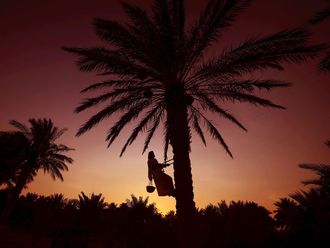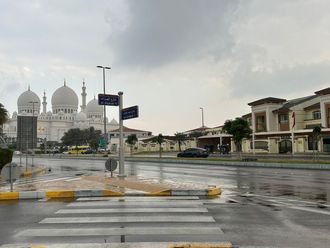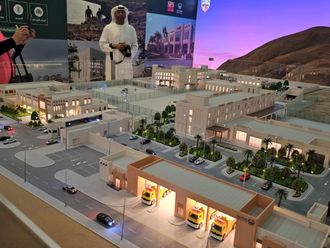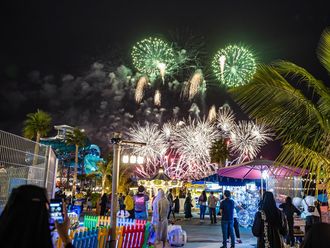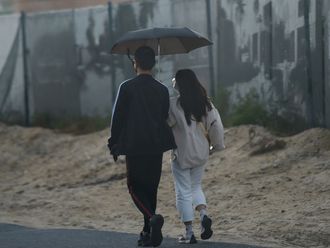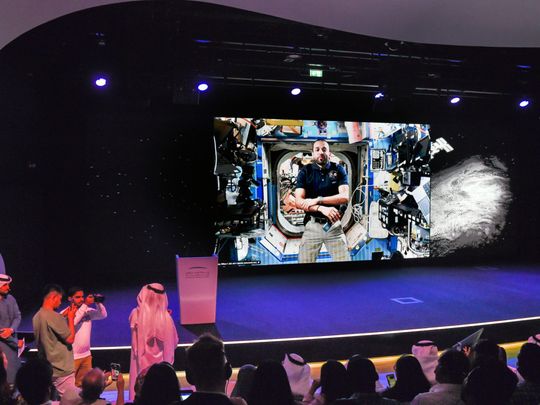
Dubai: On the 62nd International Day of Human Space Flight, UAE astronaut Sultan Al Neyadi called for protecting planet Earth after witnessing the pollution in the Himalayas region.
The earnest appeal from the ‘Sultan of Space,’ who is on the longest Arab space mission on the International Space Station (ISS) came during his live interaction with the UAE media organised by the Mohammed Bin Rashid Space Centre (MBRSC) on Thursday night.
MBRSC organised the second episode of its nationwide outreach initiative “A Call With Space,” exclusively for the media on the International Day of Human Space Flight, which marks the anniversary of the first human space flight by Yuri Gagarin on April 12, 1961.
Sporting a new look with a close cut haircut, Al Neyadi had a candid interaction with a large group of media representatives at the Museum of the Future in Dubai late on Thursday night.
Profound experience
He said the profound experience of watching Earth from space has helped him realise how important it is to protect the planet.
Al Neyadi recalled how the views of the Earth after his arrival to the ISS on March 3 offered an overall picture of the “magnificent planet and everything that has happened throughout history, the people we knew, all the events throughout the time that human beings [have been] living on Earth.”
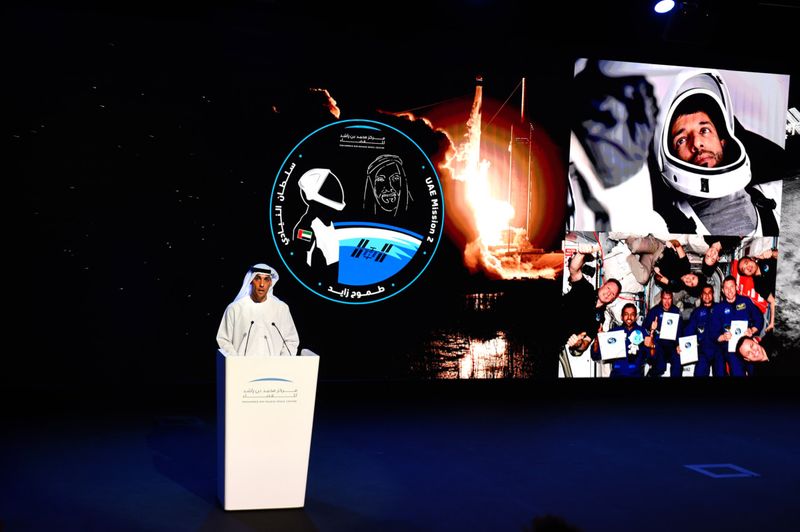
“It’s a profound experience actually. And personally, I do feel that we do need to keep this planet intact,” he said.
“Just today, I was flying over the Himalayas, and I saw that boundary between air pollution and the clouds and the other side of the Himalayas. And I thought, wow, this is really incredible, seeing like a barrier of smoke just trying to jump over the Himalayas. So we need to protect this planet. We need to be happy on this planet.”
“As an astronaut aboard the NASA Space Station, I do value the oxygen, I do value water and I do value the ability to breathe in the clean atmosphere which we get for free on Earth. So let’s keep this planet intact. Let’s keep it tidy and clean and hopefully we can live as much as Allah wants.”
He pointed out that it is the duty of the astronauts to relay the events that happen on the ISS including the scientific experiments and general experiences.
“It has been 62 years since the first human space flight. We have to think of our role. Obviously there are challenges…Looking from space, astronauts see that our planet is protected in a very thin layer. Our planet has been exposed to a lot of factors. We need to protect it.”
Al Neyadi is set to make history again by becoming the first Najmonaut (Arab astronaut) to perform a spacewalk outside the ISS on April 28.
‘If you are happy, I am happy’
Answering questions about his physical health and mental wellbeing, he said he was mentally “in a good space” and maintaining a “constant body weight.”
He said he has adapted well in space despite the challenges. “Time flies very fast in space. Days pass quickly. We see 16 sunrises and sunsets every day. But we have adapted to this biological clock. Sleeping was a bit difficult first but then I started enjoying it. The weightlessness is a thrill that I cannot describe.”
“There are several challenges. Sometimes it is difficult. We don’t walk on our legs. We actually lose some strength. We have to do exercise daily and focus on our legs and back muscles. People who do not train properly can end up getting health issues. We are also exposed to radiation.”
“Onboard the ISS we can communicate with our family on a daily basis through emails, voice calls and video calls to keep us happy. If they are happy, we are happy. And if you all on Earth are happy, then I am happy.”
Maintaining weight
Al Neyadi affirmed that he was maintaining his body weight and keeping himself in a good physical condition by regularly exercising. He said Dr Hanan Al Suwaidi of MBRSC has been constantly monitoring his health.
“My weight has been the same so far but if it changes then it needs to be addressed through diet changes and exercise.”
He highlighted the need for conducting experiments in space for the benefit of humanity. “Certain experiments cannot be done properly in gravity on Earth. We had many scientific experiments. We have daily targets and we have to be fast to finish our daily tasks. Forty days seem to be years as time flies very fast here.”
During the six-month mission on the ISS, Al Neyadi will carry out more than 200 scientific experiments, including 19 from UAE universities.
Commenting about the UAE-specific experiments, Salem Humaid Al Marri, director general of MBRSC, said: “Our objectives are really on human health, life sciences. We are looking at bone mass, dentistry and other health topics. What is happening to Sultan in space will be our focus because it is not regularly (that) you get somebody from this area going to space and the physiological changes due to the effect of microgravity may be different.”



